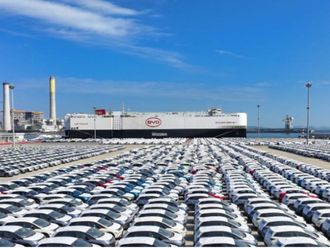London: Three months since the US lifted a 40-year ban on oil exports, American crude is flowing to virtually every corner of the market and reshaping the world’s energy map.
Overseas sales, which started on December 31 with a small cargo aboard the Theo T tanker, have been picking up speed. Oil companies including Exxon Mobil Corp and China Petroleum and Chemical Corp have joined independent traders such as Vitol Group BV and Trafigura Ltd Pet. in exporting American crude.
The “growing volumes of exports” from the US are now “spooking the markets,” Amrita Sen, chief oil analyst at consultants Energy Aspects Ltd in London, said in a note. The “flurry of export activity” is helping to support spot oil prices in the US relative to contracts for later delivery, she wrote.
With American stockpiles at unprecedented levels, oil tankers laden with US crude have docked in, or are heading to, countries including France, Germany, the Netherlands, Israel, China and Panama. Oil traders said other destinations are likely, just as supplies in Europe and the Mediterranean region are also increasing.
Small scale
That said, the US is likely to remain for the foreseeable future a small exporter compared with Opec giants Saudi Arabia, Iran and Iraq and non-Opec producers Mexico and Russia. Ian Taylor, chief executive of Vitol, the company behind the first export, believes exports will remain a “very marginal business.
Yet, tanker by tanker, overseas sales are growing.
Enterprise Products Partners LP, one of the biggest operators of oil ports in the US, told investors this month it alone expected to handle exports of crude and condensates — a form of ultra-high quality oil — of about 165,000 barrels a day during the first quarter, up almost 28 per cent from the 2015 average.
Cheaper transport
One reason behind the rise in exports is cheap pipeline and railway fees to move crude from the fields in Texas, Oklahoma and North Dakota into the ports of the US. Gulf of Mexico. Another is that US oil prices have been trading at a discount to Brent crude, allowing traders to move oil from one shore of the Atlantic to another at a profit.
The exports could relieve pressure on storage capacity in the US after stockpiles rose to the highest level in official data going back to 1930. The tanks at the oil hub of Cushing, the biggest in the country and the delivery point for benchmark West Texas Intermediate crude, are 92.5 per cent full, according to the Energy Information Administration.
The risk is that the US could shift the glut into Europe and the Mediterranean, where there are higher-than-usual loadings from the North Sea and the arrival of the first barrels of Iranian crude to the region since 2012.
Texas to Sicily
The export ban was imposed in the aftermath of a 1973 to 1974 oil embargo by the Arab members of Opec, the Organisation of Petroleum Exporting Countries. It crippled the US economy and highlighted its dependence on imports.
Before it was lifted, the US sold as much as 500,000 barrels a day overseas, from Alaska and a few other origins allowed under federal law.
Exxon in early March became the first major US oil company to ship American crude from elsewhere, sending the Maran Sagitta tanker from Beaumont, Texas, into a refinery it owns in Sicily, Italy. Days later, Sinopec lifted on the Pinnacle Spirt tanker a cargo of US crude, a first for a Chinese oil group.
Oil traders are starting to export American crude to store it overseas and profit from a market condition called contango. That’s where prices of oil for delivery today are lower than those in future months. Buyers with access to storage can fill up their tanks with cheap crude and sell higher-priced futures contracts to lock in a profit.
Gunvor Group Ltd, a commodities trader with main offices in Geneva, plans to ship 600,000 barrels of US crude to a storage terminal in Panama. It’s then likely to ship the crude in Europe.
Oil traders are expecting more vessels to depart over coming weeks, with companies seeking to open new export routes from the US West Coast and also moving barrels from new locations, including directly out of Cushing.












